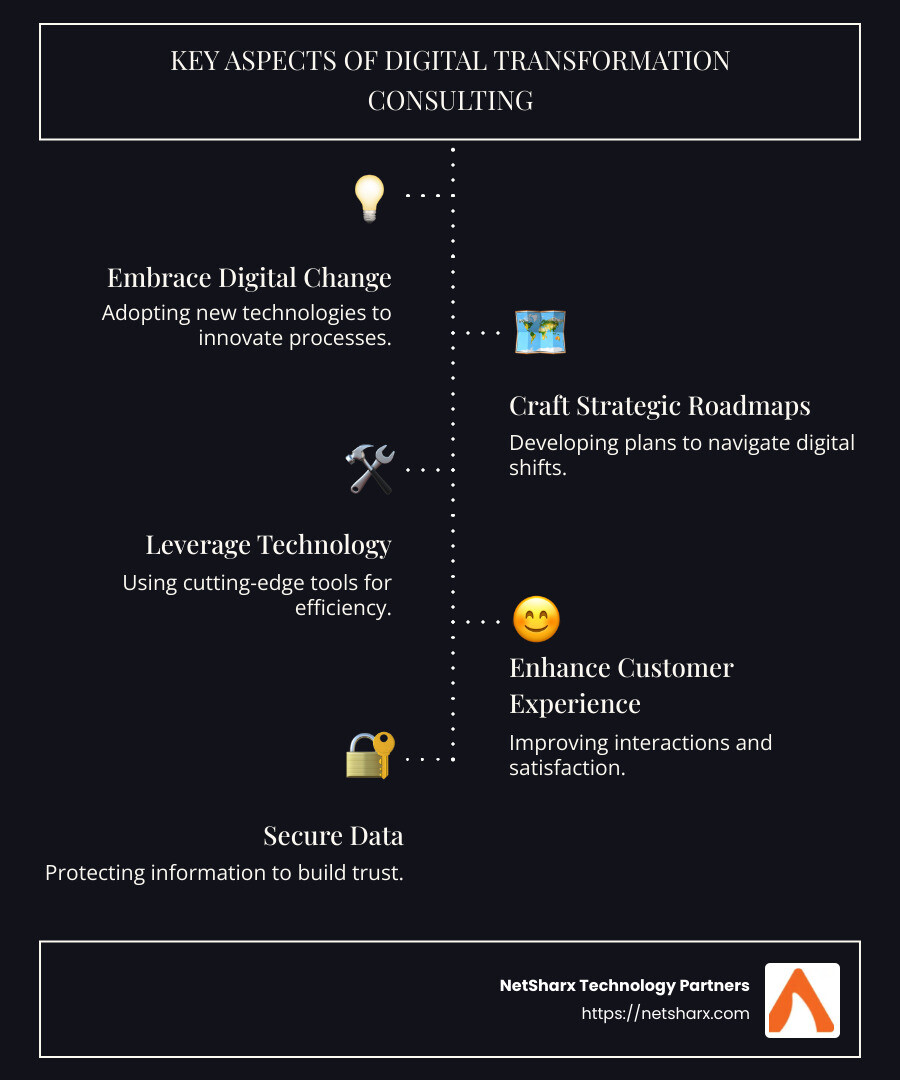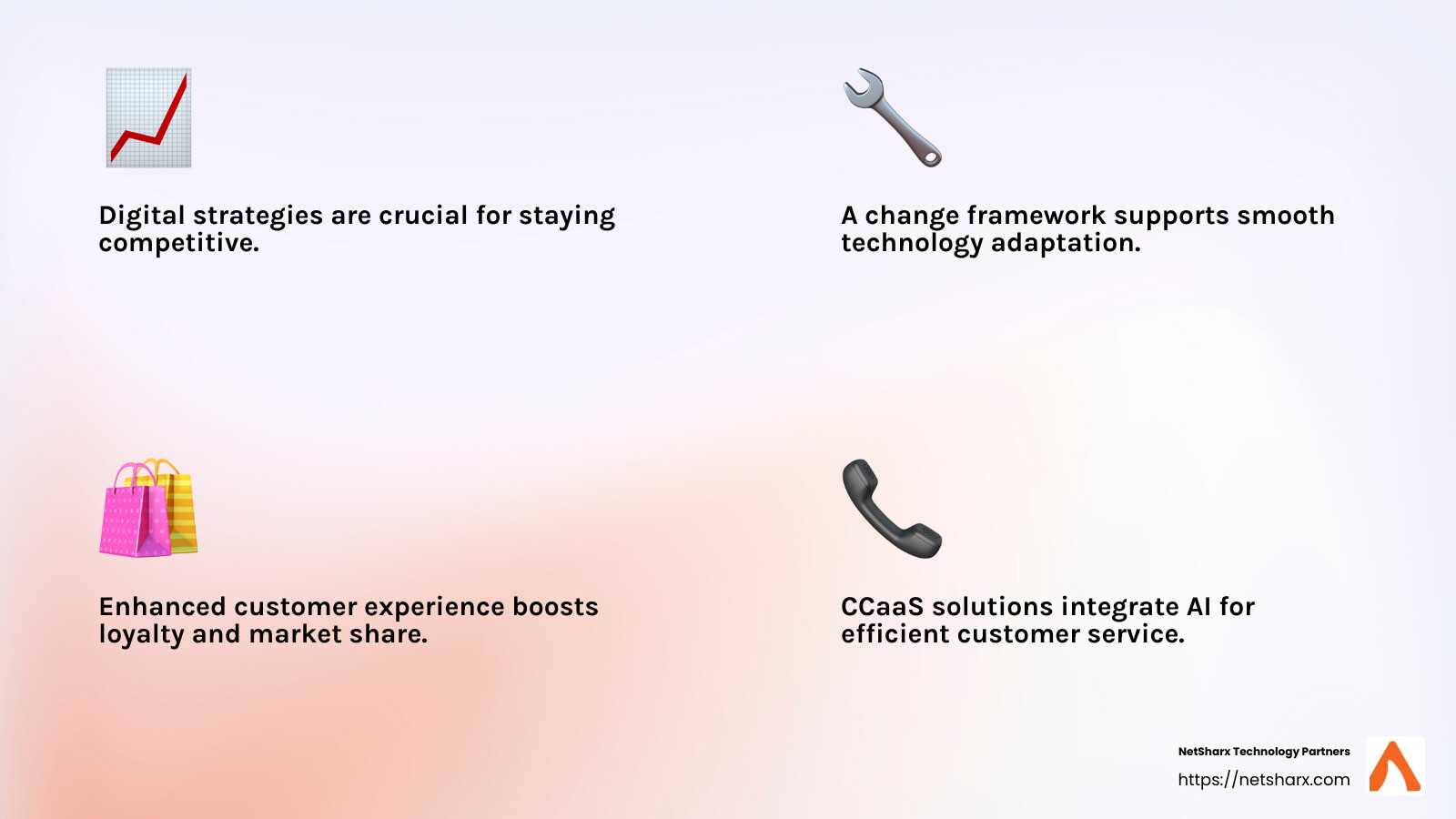In today’s business environment, digital change consulting is the key to revolutionizing the way companies operate and compete. The essence of digital change consulting lies in helping businesses accept technology, refine their strategies, and adapt to the rapid changes in the digital landscape. Here’s a quick breakdown:
- Digital Change: Embracing new technologies to innovate business processes.
- Strategy: Crafting a roadmap to steer digital shifts effectively.
- Technology: Leveraging cutting-edge tools to improve efficiency and value.
Digital change isn’t just about introducing new tools; it’s about evolving how organizations function and compete. With the right strategy, businesses can harness technology to drive meaningful change. Whether it’s refining operations, enhancing customer experiences, or securing data, digital change consulting is imperative for staying ahead of the curve.
I’m Ryan Carter, founder and CEO of NetSharx Technology Partners. With a deep background in digital change consulting, my team and I are committed to helping mid-market businesses and enterprises swiftly and efficiently transition to cloud technology.
Learn more about digital change consulting:
– data center migration solution
– data center solution provider
– secure colocation solution
Understanding Digital Change Consulting
Digital change consulting is all about guiding businesses through the maze of new technologies and strategies. At its core, it involves creating a digital strategy, establishing a change framework, and enhancing the customer experience.
Digital Strategy
A digital strategy is like a roadmap. It helps businesses know where they are going and how to get there. It involves setting clear goals and identifying the best digital tools to achieve them. This strategy is crucial for companies to stay competitive and relevant. For example, many companies are asking, “What is my Uber?” This reflects the need to anticipate and counter digital disruption by competitors.
Change Framework
A change framework is the structure that supports digital change. It’s about setting up processes that help a company adapt to new technologies smoothly. This involves stages like innovating, incubating, and industrializing—essentially moving from an idea to a large-scale implementation. The framework helps businesses manage talent, build digital skills, and transform ways of working to become more agile and responsive.
Customer Experience
Customer experience is at the heart of digital change. Today’s consumers expect seamless, fast, and personalized interactions, much like their experiences with Amazon. Improving customer experience can lead to increased loyalty and market share. For instance, Contact Center as a Service (CCaaS) solutions are changing customer service by integrating AI and multi-channel communications, making interactions more efficient and satisfying.
In summary, digital change consulting helps businesses create a strategic path, establish a supportive framework, and prioritize customer satisfaction. This ensures they not only survive but thrive in the digital era.
Next, let’s explore the Key Areas of Digital Change, where we’ll dig into how businesses are reshaping their models, processes, and organizational structures to align with the digital age.
Key Areas of Digital Change
Digital change is reshaping the business landscape. Companies are changing their business models, updating processes, exploring new domains, and reorganizing their structures to thrive in the digital age.
Business Model
Adapting a business model is crucial. Companies must reimagine how they deliver value. This might mean shifting from a product-based to a service-based model, or even embracing subscription services. For instance, the question “Should I invest in new digital business opportunities?” is common. Businesses are constantly evaluating whether to innovate their current models or pivot to entirely new ones.
Process Change
Updating processes is about efficiency. Businesses are moving from traditional, rigid methods to more agile and flexible processes. This is where automation and digital tools come into play. By embracing technology, companies can streamline operations, reduce costs, and improve speed to market. The stages of innovate, incubate, and industrialize help businesses test and scale new technologies effectively.
Domain Change
Exploring new domains involves branching into new areas of business. This can mean leveraging existing capabilities in new ways or entering entirely different sectors. For example, a retail company might explore e-commerce or digital marketing as new revenue streams. This kind of change requires a solid understanding of digital tools and a willingness to experiment with new business avenues.
Organization Change
Finally, organizational change is about culture and structure. It’s crucial for companies to foster a culture that accepts digital. This means encouraging cross-functional collaboration and adopting agile ways of working. Aligning governance and processes with a platform-driven model, rather than a siloed one, enables better decision-making and faster responses to market changes.
Digital change consulting helps businesses steer these key areas of change. By reshaping their business models, updating processes, exploring new domains, and reorganizing structures, companies can stay ahead in the digital era.
Next, we’ll dive into The Five Pillars of Digital Change, exploring how digitizing operations, technology, culture, leadership, and customer experience form the foundation for successful change.
The Five Pillars of Digital Change
Digital change isn’t just about adopting new technologies. It’s about changing the very core of how businesses operate. Let’s explore the five pillars that form the foundation of successful digital change: digitizing operations, technology, culture, leadership, and customer experience.
Digitizing Operations
First up, digitizing operations. This means using digital tools to make business processes more efficient. Think automation, data analytics, and cloud computing. For example, companies are moving away from legacy systems to platforms like UCaaS, which improves communication and collaboration. By streamlining operations, businesses can reduce costs and increase productivity.
Technology
Next, technology. A solid digital change strategy relies heavily on a robust technology backbone. This includes building a data and digital platform (DDP) that uses components like data lakes, APIs, and microservices. Such platforms enable modular, scalable application development and easy data access.
Fun fact: Only 28% of organizations have fully completed their digital change journey, highlighting the ongoing nature of this process.
Culture
Culture is a crucial pillar. Digital change requires a shift in mindset. Companies need to foster an environment that accepts innovation and agility. Encouraging cross-functional collaboration and iterative learning helps teams adapt and thrive at “digital speed.” It’s about moving away from silos and towards a more integrated way of working.
Leadership
Leadership plays a pivotal role in guiding digital change. Leaders must champion the change, setting clear priorities and aligning the organization. They need to adopt a digital mindset, ensuring all levels of the organization are on board with the change. Simplified decision-making and new KPIs are key to monitoring progress and achieving outcomes.
Customer Experience
Finally, customer experience. Customers expect seamless, personalized interactions. Companies must focus on enhancing customer experiences through technologies like CCaaS. By improving customer service KPIs and leveraging data insights, businesses can build loyalty and differentiate themselves from the competition.
In summary, digital change consulting helps businesses steer these five pillars. By focusing on operations, technology, culture, leadership, and customer experience, companies can successfully transform and thrive in the digital era.
Next, we’ll address some Frequently Asked Questions about Digital Change Consulting, including what digital change consultants do and the main areas they focus on.
Frequently Asked Questions about Digital Change Consulting
What does a digital change consultant do?
A digital change consultant is like a guide for businesses venturing into the digital world. Their main job is to help companies steer the complexities of digital change. These consultants start by understanding a company’s current processes and technologies. Then, they suggest new digital tools and strategies to improve efficiency and profitability.
Digital change consultants also help organizations integrate advanced technologies like AI and cloud computing. They ensure that the transition is smooth, minimizing disruptions and maximizing benefits. By focusing on both technology and people, they humanize the process of change management, creating a unified experience for employees and customers alike.
What are the main areas of digital change?
Digital change impacts several key areas within an organization. Here’s a quick rundown:
-
Business Model: Digital change often means rethinking how a company makes money. This could involve creating new digital products or services or finding new ways to deliver existing ones.
-
Process: This involves digitizing and automating business processes to increase efficiency. For example, using data analytics and cloud platforms to streamline operations.
-
Domain: Digital change can also mean expanding into new markets or areas. This might involve leveraging digital tools to enter new industries or geographies.
-
Organization: Finally, digital change affects the entire organization. This includes changing the culture to accept innovation and agility, as well as adjusting leadership styles to support digital initiatives.
How much do digital change consultants make in the US?
The salary of a digital change consultant can vary based on experience, location, and the complexity of the projects they handle. On average, these consultants earn a competitive salary, reflecting their specialized skills and the high demand for their expertise.
-
Salary Range: According to industry data, digital change consultants typically earn between $70,000 to $150,000 annually. However, this can vary widely based on factors like location and experience level.
-
Percentile and Compensation: In the upper percentiles, consultants with extensive experience and a proven track record in leading successful digital change projects can earn significantly more. Compensation often includes bonuses and other incentives tied to the success of the change initiatives they lead.
In summary, digital change consulting is a dynamic field that offers both challenges and rewards. By focusing on consulting services, digital technologies, and key areas like business models and processes, consultants help organizations thrive in the digital age.
Next, we’ll dive into the Conclusion, where we’ll explore how NetSharx Technology Partners provides custom solutions for technology change.
Conclusion
At NetSharx Technology Partners, we understand that digital change consulting is not a one-size-fits-all approach. Every business has unique needs and challenges. That’s why we focus on delivering custom solutions custom to each client’s specific goals and circumstances.
Our strength lies in our unbiased approach. We provide access to a vast network of technology providers, ensuring that our clients have the flexibility to choose the best solutions for their needs. With over 330 providers and 1,600 data centers at our disposal, we offer unparalleled options for businesses looking to transform digitally.
Technology change can be daunting, but it doesn’t have to be. We simplify the process through our expert guidance and comprehensive support. Our solution engineers work closely with clients to steer through the complexities of cloud, network, cybersecurity, and communications solutions. By doing so, we help businesses not only adapt to change but thrive in it.
We know that digital change is more than just adopting new technologies—it’s about reimagining business models, optimizing processes, and fostering a culture of innovation. Our commitment is to partner with you on this journey, ensuring that every step is aligned with your strategic vision and operational needs.
Ready to explore how our custom solutions can drive your technology change? Learn more about our data center services and how we can help you achieve your digital change goals.
In the end, our mission is simple: to deliver extraordinary service based on long-term relationships, confidence, trust, loyalty, and transparency. Let’s start on this digital journey together, changing challenges into opportunities for growth.




